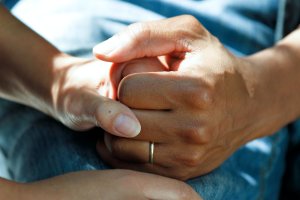We support patient autonomy and work to protect patients from the imposition of other people's personal religious views.
There is widespread support amongst the public for a compassionate law that permits assisted dying under certain circumstances.
But religious lobbying exerts a disproportionate influence on the debate on assisted dying, frustrating much-needed reform.
Assisted dying (AD) is when a person chooses to be given help to die, usually because they are terminally ill and suffering unbearably.
AD is legal in a growing number of countries around the world. In all these jurisdictions there are strict guidelines and safeguards to ensure AD is not misused. Where AD is an option, it complements palliative care rather than replacing it.
AD is not explicitly legal anywhere in the UK. Terminally ill people who wish to end their suffering more quickly have very few options.
Travelling to a country where their death can be assisted legally isn't a viable option for most, due to the high expense and the difficulties in travelling with a terminal illness. What's more, friends and relatives who accompany or help someone travel abroad for AD may be prosecuted.
Terminally ill people in the UK may therefore resort to taking their own life, leading to botched suicides, or asking the help of loved ones. This puts friends and relatives in a horrendous position: either they must watch their loved one suffer, or they must help them die and risk jail in the process.
The largest poll ever conducted on assisted dying found 84% of people in Britain support a change in the law. This includes 82% of Christians and 90% of nonreligious people.
Many regard refusing people a final relief from unbearable suffering as a harmful act. But strong opposition to AD comes from religious leaders who think AD goes against the will of their gods.
We support the democratic right of all people to contribute to the debate on AD. But policy decisions should be guided by evidence, compassion and respect for the principle of patient autonomy, rather than religious dogma. The views of the general public, professionals and relevant organisations should be fairly reflected at policy level.
Within the National Secular Society, individual members hold a range of views about AD. All are agreed that religious privilege should have no place in the decision-making process.
Take action!
1. Write to your MP
Ask your MP to support properly regulated assisted dying.
2. Share your story
Tell us why you support this campaign, and how you are personally affected by the issue. You can also let us know if you would like assistance with a particular issue.
3. Join the National Secular Society
Become a member of the National Secular Society today! Together, we can separate religion and state for greater freedom and fairness.
Latest updates
NSS welcomes parliamentary inquiry into assisted dying
Posted: Wed, 7 Dec 2022 13:20
The National Secular Society has welcomed the health and social care committee's decision to open a parliamentary inquiry into assisted dying in 2023.
Announced on Monday, the inquiry has put out a call for evidence from healthcare professionals and campaign groups. Members of the public have also been invited to make anonymised submissions to the committee. The inquiry's recommendations will then be put to the government.
The NSS will make a submission calling for reform of the existing law in England and Wales, under which helping an individual to die is punishable by up to 14 years' imprisonment.
Committee chair Steven Brine MP said: "What has changed in recent years is that there is now real-word evidence to look at. We will look at the moral, ethical and practical concerns raised in a way that is informed by actual evidence."
YouGov polling from 2021 found over 70% of Britons support reforms to legalise assisted dying.
All 26 bishops in the House of Lords, who enjoy automatic seats by right, have opposed changes to the law. Religious groups, including some opposed to same-sex marriage and abortion rights, have also lobbied against reform.
Last year, Baroness Meacher introduced a private member's bill which would have legalised assisted dying for mentally competent, terminally ill adults following approval by two independent doctors and a High Court judge. The government assigned it insufficient parliamentary time to progress.
Assisted dying is now legal in at least 27 jurisdictions worldwide. Since 2002, almost 500 Britons have resorted to travelling to Dignitas in Switzerland to receive help ending their lives. At an average cost of £10,000, this option remains out of reach for many.
NSS: 'Evidence-based inquiry welcome, if longer overdue'
NSS campaigns officer Dr Alejandro Sanchez said: "A parliamentary inquiry into assisted dying, informed by an evidence-based approach, is welcome, if long overdue.
"The British public overwhelmingly supports the legalisation of properly regulated assisted dying.
"For too long the bishops bench and religious pressure groups have sought to prevent scrutiny of this important area of the law.
"Religious dogma can no longer be allowed to prevent mentally competent, terminally ill adults from making their own decisions about end-of-life care."
If you would like to contribute your views to the inquiry, you can do so here.
Scotland assisted dying consultation: 76% support legalisation
Posted: Mon, 12 Sep 2022 11:04
A "clear majority" of respondents to a consultation on legalising assisted dying in Scotland support the proposals, including the National Secular Society.
According to a report on the consultation published last week, 76% of respondents were "fully supportive" of the proposed bill, which would enable competent adults who are terminally ill to be provided with assistance to end their life at their request.
The NSS backed the proposals in November and was quoted several times in the report.
The consultation generated over 14,000 responses. This is the highest number received to date for a consultation for a proposed Member's Bill in the Scottish Parliament.
Under the proposals in the consultation by Liberal Democrat MSP Liam McArthur, registered healthcare practitioners would be allowed to provide life-ending medication to a patient who has requested an assisted death in writing and who has been diagnosed as terminally ill by two doctors.
There is currently no specific legislation that governs assisted dying in Scotland. However, assisting the death of another may give rise to liability for either murder or culpable homicide.
A final proposal will be lodged in the Scottish Parliament with a view to introducing a Member's Bill if it secures sufficient support.
Religious opposition to assisted dying
Less than a quarter of respondents (21%) were "fully opposed" to the proposal, with a further 0.4% partially opposed.
The report said: "One of the most common reasons given for opposing the proposal was a fundamental belief, often founded in a particular religion, that human life is sacred and must not be purposefully ended under any circumstances".
The majority of organisations which responded to the consultation were fully opposed to the proposal. Most of these were either specifically religious organisations, or organisations clearly linked to a particular religion.
This is in contrast to the individual members of the public who responded, over 80% of whom supported the proposals.
NSS: Reform on assisted dying needed "as a matter of urgency"
NSS head of campaigns Megan Manson said: "That this consultation received an unprecedented number of responses reveals how strongly the public feel about Scotland's laws regarding assisted dying. And the overriding feeling is that those laws aren't working.
"The overwhelming support for the proposed bill allowing assisted dying as a choice for the terminally ill must be heeded, and the laws reformed as a matter of urgency."
"The majority of organisations opposed to the bill are religious in nature. We support the democratic right of all people to contribute to this debate. However, the over-representation of religious groups and the special status granted to religious groups currently impose a disproportionate level of influence.
"Our laws must protect individuals to ensure other people's religious beliefs are not imposed on them and limit their choices and autonomy."




